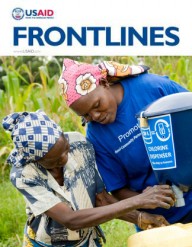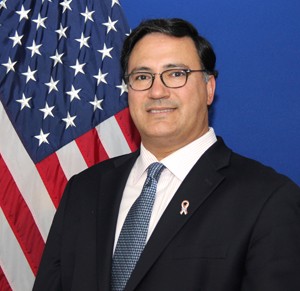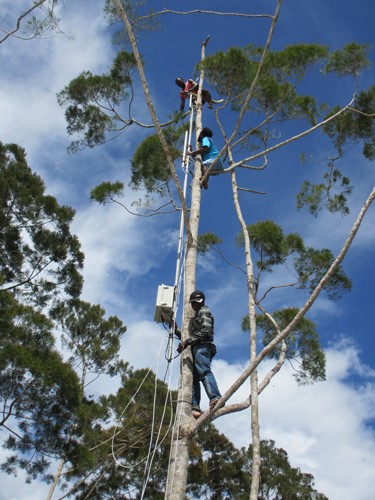 Riders for Health helps maintain motorcycles so outreach workers can provide health education, immunizations, HIV counseling and other services to rural areas.
Photo courtesy of Riders for Health
Riders for Health helps maintain motorcycles so outreach workers can provide health education, immunizations, HIV counseling and other services to rural areas.
Photo courtesy of Riders for Health
 Riders for Health helps maintain motorcycles so outreach workers can provide health education, immunizations, HIV counseling and other services to rural areas.
Photo courtesy of Riders for Health
Riders for Health helps maintain motorcycles so outreach workers can provide health education, immunizations, HIV counseling and other services to rural areas.
Photo courtesy of Riders for Health
In developing countries, innovators practicing in the field are discovering inspired approaches to development problems. At universities, professors and students have the sophisticated methods that could expand those innovations dramatically. USAID is trying a new approach to put those groups together—funding the creation of “Development Labs” inside universities working directly to evaluate and strengthen real-world innovations in development. Development Labs at seven universities form the Higher Education Solutions Network (HESN), a cooperative effort launched in November 2012.
Backed by up to $137 million from USAID, each of the universities—Duke University, Makerere University in Uganda, Massachusetts Institute of Technology, Michigan State University, University of California-Berkeley, Texas A&M and the College of William & Mary—has established a Development Lab composed of university faculty, students and partners. Beyond the seven universities hosting Development Labs, the network extends to collaborators at more than 100 partner institutions in academia, civil society and government in 38 countries.
“Through this network of Development Labs, we will recapture the legacy of science, technology, and innovation as core drivers of development, as well as inspire and support the next generation of development leaders,” USAID Administrator Rajiv Shah said at the HESN launch.
The labs began activities this past spring and will present their initial accomplishments at the first HESN TechCon scheduled for Nov. 16-18 at the William & Mary campus in Williamsburg, Va.
At its heart, the network combines the creativity often found on university campuses with the means of resource-rich partners and the institutional know-how of USAID.
“At USAID, we’re looking to expand the boundaries of innovation and inspire collective action,” said Wendy Taylor, director of the Center for Accelerating Innovation and Impact in USAID’s Bureau for Global Health. “[University students] will help us tap into a new repository of innovators who will approach long-held problems in new, creative ways.”
Keep reading for some of the ways the seven HESN universities are striving to make a difference.
Duke University
Overcoming barriers to health care is the focus at Duke University. That means finding innovators around the world who are using creative methods to increase health-care access and quality, then accelerating their work. HESN helped launch the Social Entrepreneurship Accelerator at Duke, which recently selected 13 innovators to receive intensive technical assistance in cooperation with Duke’s International Partnership for Innovative Healthcare Delivery.
For example, in seven countries in sub-Saharan Africa where roads are lacking, the nonprofit Riders for Health helps maintain motorcycles so outreach workers can provide health education, immunizations, HIV counseling and other services to rural areas.
Other innovators are using mobile and web technology to cut costs and increase transparency. Sproxil, a U.S.-based for-profit venture, has devised an affordable approach to expose counterfeit medicine, which is rampant in developing countries, and often ineffective or hazardous. A scratch-off card on the package reveals a unique code that consumers can send by text message to Sproxil to confirm product authenticity. Duke is helping Sproxil increase the scale of the approach in India, Ghana, Kenya and Nigeria.
Others are improving health-care access through efficiencies. In Mexico, salaUno lowered the cost of cataract surgery by 60 percent with a high-volume “hub and spoke” system, which provides many low-cost optometry clinics for screening patients but a limited number of surgery locations.
SalaUno co-founder Javier Okhuysen said Duke “continues to provide access to both [kinds of] expertise through focused student projects as well as key business collaborations needed for us to grow our model.”
“Your research, imagination, and spirit of entrepreneurship will be critical for us to both fill the knowledge gaps, but more importantly, to go out into the field and make a difference.” – USAID Assistant Administrator for Global Health Ariel Pablos-Mendéz, speaking before a group of international innovators at Duke University, April 2013
Massachusetts Institute of Technology
Recognizing the potential of innovation is the focus at the Massachusetts Institute of Technology (MIT), where HESN has enabled the creation of two Development Labs. The Comprehensive Initiative for Technology Evaluation is designing methods to assess the utility of innovations. Results will be shared online on the model of Consumer Reports, the U.S. magazine that provides unbiased reviews and ratings of consumer products.
For example, in summer 2013, MIT researchers tested multiple types of solar lanterns on campus and traveled to Uganda to learn how people use them.
Meanwhile MIT’s International Development Innovation Network will encourage social entrepreneurs by establishing Innovation Centers in Brazil, Ghana, Tanzania, Uganda and Zambia; and by holding International Development Design Summits in Ghana, Haiti, Singapore and Tanzania. The summits are designed to welcome entrepreneurs from all walks of life, from farmers to academics.
At a July summit in Zambia, 46 participants worked in teams with community representatives to tackle pressing local challenges such as food spoilage, child nutrition, menstrual hygiene and waste management.
University of California-Berkeley
The benefits of innovation often fail to reach the poor because of socio-economic barriers such as market inefficiencies. HESN partners at the University of California, Berkeley believe that socio-economic analysis must be built into technology design from the outset, and have created a new discipline—development engineering—to put this notion into practice.
HESN funded a consortium with Lawrence Berkeley National Lab, University of Washington and other West Coast institutions to create the Development Impact Lab at UC Berkeley to give birth to this new field. In addition to training students in the new discipline, the Development Impact Lab supports demonstration projects such as the CellScope, which turns a standard cell-phone camera into a diagnostic-quality microscope that allows health workers in areas without labs to obtain analysis remotely.
Makerere University
Makerere University in Kampala, Uganda, is focusing on resilience—sub-Saharan Africa’s ability to withstand and recover from the shocks and stresses of poverty, conflict, displacement, disease and drought. In collaboration with Tulane and Stanford Universities and the Center for Strategic and International Studies, Makerere is using its HESN grant to anchor a network of Resilience Innovation Labs at African universities to find creative local solutions to increasing resilience.
Strengthening resilience in climate change will be the focus of the lab hosted at Makerere; population growth and urbanization at the University of Health and Allied Sciences in Ho, Ghana; chronic displacement in the region at Jimma University in Ethiopia; and chronic disease at the University of Pretoria, South Africa. The ResilientAfrica Network (RAN) plans a massive online course to share the methods with hundreds of students, faculty, innovators and communities.
“I am excited to see that the RAN is using the power of science and technology to leapfrog traditional development paths. In light of the innovations and new technologies I’ve already seen, I am extremely confident that they can make a huge difference throughout Africa,” said Alex Dehgan, science and technology adviser to the USAID administrator, as he visited an exhibition of HESN-supported innovations at Makerere.
Michigan State University
HESN enabled Michigan State University to launch the Global Center for Food System Innovation, which is addressing critical pressures on the world’s food supply. The center is encouraging creative approaches with grant competitions such as the Student Innovation Challenge, which will send students to 13 countries to devote their graduation projects to solving food-chain problems. At the same time, the center is analyzing system-level problems in the global food chain—“megatrends” that span borders and generations and will require international cooperation.
Texas A&M University
At Texas A&M University, HESN enabled the creation of the Center on Conflict & Development, which emphasizes research that can bring about solutions in countries affected by conflict. For example, the center is studying the effect of conflict on food supply in Ghana, Liberia and Senegal with an eye toward recommending interventions to enhance food security. This summer the center sent students to Guatemala and India to conduct photojournalistic documentation of conflict-affected areas. The center also plans to establish field labs in Afghanistan and the Democratic Republic of Congo in the coming months.
The College of William & Mary
Precisely mapping aid projects and their impact is the emphasis at the College of William & Mary, where HESN funding has supported the establishment of the AidData Center for Development Policy. The center aims to map all donor-funded activities in up to 15 developing countries while creating sophisticated geospatial tools to monitor their impact. With an online Aid Management Platform created by Development Gateway, users can see where development assistance is spent, analyze gaps in service, and identify duplication of efforts with interactive maps. Undergraduates from William & Mary, Brigham Young University and the University of Texas at Austin traveled to Haiti, Mexico, Nepal, Senegal, Timor-Leste and Uganda this past summer to “geo-code” hundreds of donor projects. They also contributed to “hackathons,” brainstorming how to apply AidData to local challenges.











Comment
Make a general inquiry or suggest an improvement.